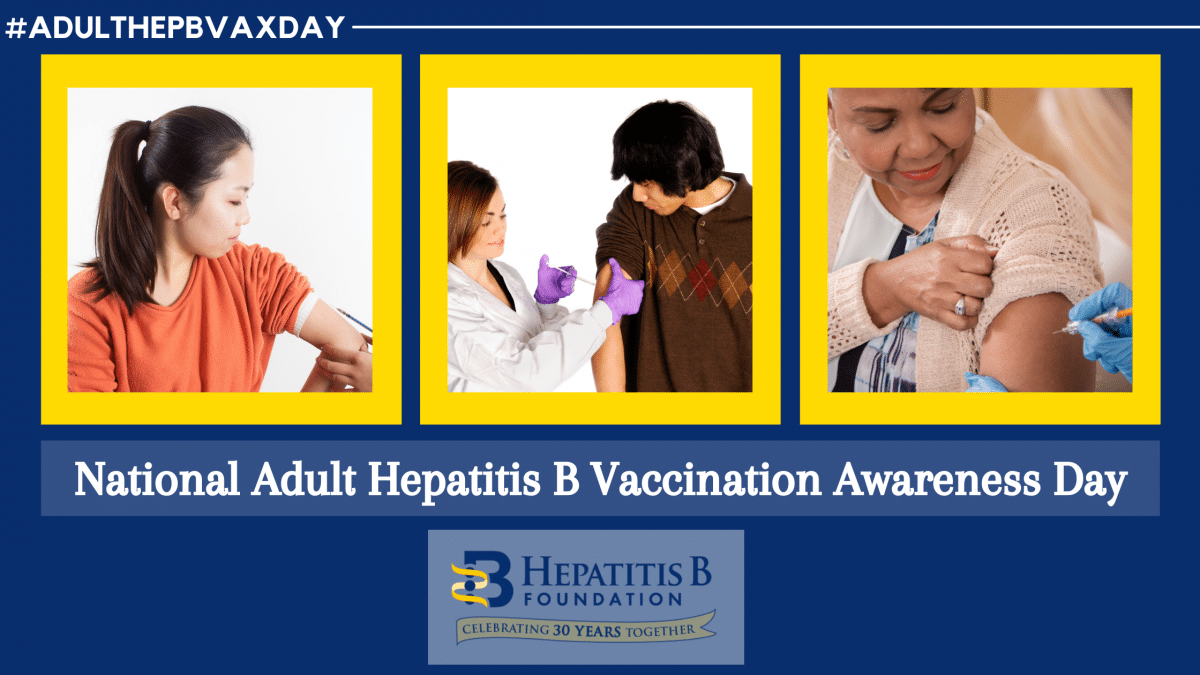
The Need for an Adult Hepatitis B Vaccination Awareness Day
In 2019, the hepatitis B community successfully advocated for the introduction of U.S. House and Senate resolutions to designate April 30th as National Adult Hepatitis B Vaccination Awareness Day for the first time! Two years later, the Hepatitis B Foundation is proud to support this day and continue adult vaccination efforts as we gear up for May, Hepatitis Awareness Month.
On April 30th we bring awareness to adult hepatitis B vaccination efforts. Despite a safe and effective hepatitis B vaccine, only 25% of the U.S. adult population has been vaccinated, primarily due to people being born before the vaccine was universally recommended.1 New hepatitis B infections are highest among people aged 30-49 years because many people at risk in this group have not been vaccinated in spite of federal recommendations.
Acute hepatitis B cases are rising partially due to the opioid epidemic with the increase in injection drug use. Hepatitis B can be spread through needle sharing or unsterile drug injection equipment. Additionally, hepatitis B can be transmitted from mother-to-child, and about 1,000 newborns become infected each year in the U.S..2 This statistic is concerning because mother to child transmission can be prevented in most cases with appropriate use of the vaccine. When exposed to the hepatitis B virus at birth, 90% of newborns will develop chronic life-long infection, putting them at much greater risk for cirrhosis and liver cancer.
Immunization rates also remain low among vulnerable populations including those living with other chronic conditions such as hepatitis C, HIV, kidney disease, or diabetes. In fact, just 12% of diabetic adults 60 years old or older are fully vaccinated, and 26% of diabetic adults ages 19-59 have received the complete vaccine series. Healthcare workers are an under-vaccinated vulnerable population as well. According to the Centers for Disease Control and Prevention, just 60% of healthcare personnel have completed their vaccine series. Get yourself vaccinated for yourself and your loved ones!
How to Become Vaccinated for Hepatitis B
In the era of COVID, we are reminded how important vaccines are. Make sure you and your loved ones are vaccinated for hepatitis B. If you are not vaccinated, ask your doctor or healthcare provider for the hepatitis B vaccine. This safe and effective vaccine is given in 2 or 3 doses depending on the vaccine:
The three-dose vaccine (scheduled at 0, 1 and 6 months):
- The first dose is administered at any time (newborns should receive their first dose in the delivery room).
- The second dose is administered one month after the first dose.
- The third dose is administered 6 months after the first dose.
Sometimes committing to a 3-dose shot is hard. Luckily, there is an approved 2-dose hepatitis vaccine, Heplisav-B, for adults in theU.S..
The two-dose vaccine:
- The first dose is administered at any time.
- The second and final dose is administered one month after the first dose.
More information on the dosing schedule can be found here.
—
You can show your support for National Adult Hepatitis B Vaccine Day by using the social media toolkit and hashtag #AdultHepBVaxDay on April 30th and when discussing the hepatitis B vaccine on social media! Graphics are also available to share throughout your networks.
Join the Hepatitis B Foundation and other leading hepatitis organizations for a Congressional Briefing on Thursday, April 29th at 3pm ET where a group of panelists will discuss how we can work towards achieving health equity by increasing adult hepatitis B vaccination rates.
—
References
- https://www.cdc.gov/hepatitis/populations/idu.htm
- https://www.hhs.gov/hepatitis/learn-about-viral-hepatitis/hepatitis-b-basics/index.html
Author: Evangeline Wang
Contact Information: info@hepb.org

